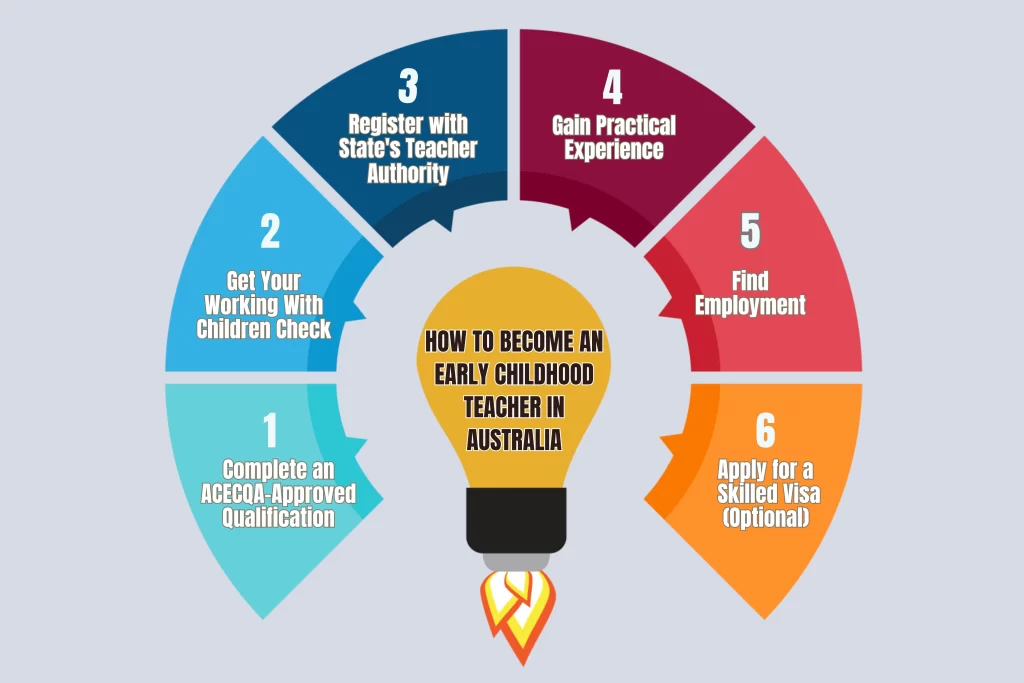Australia is placing increasing emphasis on early years education, recognizing its impact on long-term development. As a result, there is a rising demand for qualified Early Childhood Teachers in Australia across all states and territories. This demand is not only creating rewarding career opportunities for teachers but is also opening doors for skilled migration to Australia.
What if it was not just about immigration pathways or pay scales?
What if it was about choosing to nurture potential where it begins?
About showing up in a child’s earliest years. Not just to teach, but to believe in the world they’re still discovering. So this blog is exactly for you mate!
Table Of Content
1Is an Early Childhood Teacher in Demand in Australia?2Early Childhood Teacher in Australia Requirements3ACECQA Skills Assessment4How to Become an Early Childhood Teacher in Australia5Early Childhood Teacher Jobs in Australia6Early Childhood Teacher Salary in Australia7PR Pathways for Early Childhood Teachers in Australia7The Bottom Line8Frequently Asked Questions
Is an Early Childhood Teacher in Demand in Australia?
Yes, Early Childhood Teachers are high in demand in Australia.
The Australian Government has identified this role as a critical occupation in its Skilled Occupation List, making it a priority for visa processing and skilled migration.
This demand is being driven by:
- Rising population and increased enrollment in childcare and kindergarten programs.
- Government policies focused on improving early childhood education standards.
- Expansion of early learning centers and preschools nationwide.
Applications are welcome by qualified early years educators, especially with international qualification and experience to work in Australia with the assistance of different skilled visa programs.
Early Childhood Teacher in Australia Requirements
To work as an Early Childhood Teacher in Australia, you must hold a bachelor’s degree in early childhood education or a related field, including at least 45 days of supervised teaching practice with children aged 0–8.
If your degree is in another field, you can pursue a Graduate Diploma or Master of Teaching. You must also meet English proficiency standards, typically an IELTS Academic score of 7.0 in reading/writing and 8.0 in speaking/listening, unless exempt.
Registration with the relevant state or territory teaching authority is mandatory in most regions, and your qualification must be ACECQA-approved.
Let’s look at a detailed explanation of the Early Childhood Teacher requirements in Australia:
1. Educational Qualifications
To start your journey, you’ll need a bachelor’s degree in early childhood education or a closely related field. This usually involves 3–4 years of full-time university study.
Already have a degree in another field? No problem. You can take an alternative route by completing a Graduate Diploma or Master of Teaching (Early Childhood), which typically takes 1–2 years.
Whichever path you choose, your qualification must include at least 45 days of supervised teaching practice with children aged birth to 8 years.
2. Skills Assessment
If you’re planning to migrate to Australia and work in early childhood education, you’ll need to complete a skills assessment through the Australian Children’s Education and Care Quality Authority (ACECQA).
As of December 7, 2024, ACECQA is the official assessing authority for early childhood teaching roles, replacing AITSL for this purpose.
To be eligible, you must demonstrate:
- At least four years of higher education, which may include a combination of bachelor’s and postgraduate qualifications.
- A completed initial teacher education qualification with a clear focus on early childhood education.
- Evidence of supervised teaching practice with children aged birth to 8 years.
3. English Language Proficiency
If English isn’t your first language, you’ll need to prove your proficiency through IELTS Academic:
- 7.0 in reading and writing
- 8.0 in speaking and listening
Exemption:
If you’ve completed at least four years of higher education in countries like Australia, Canada, Ireland, New Zealand, the UK, or the USA, you may be exempt from this requirement.
4. Registration & Accreditation
Registration depends on where you plan to work in Australia:
- Mandatory registration is required in Victoria, South Australia, Western Australia, and New South Wales.
- In Queensland, Tasmania, ACT, and the Northern Territory, registration may be required if you work in a school or a preschool attached to a school.
5. Additional Requirements to Consider
If you’re looking into permanent residency pathways, keep in mind:
- At least 3 years of relevant work experience may be needed.
- Always ensure that your qualification is listed on the ACECQA approved qualifications list before applying.
ACECQA Skills Assessment
ACECQA stands for the Australian Children’s Education and Care Quality Authority. It is the official body responsible for assessing the skills and qualifications of individuals aiming to work in early childhood education roles across Australia.
Who Needs an ACECQA Skills Assessment?
You’ll need to apply for an ACECQA skills assessment if you’re seeking migration to Australia under any of the following occupations:
- Early Childhood (Pre-Primary School) Teacher
- Child Care Centre Manager
- Child Care Worker (Group Leaders only)
This assessment is a mandatory step in your visa application process if you’re applying through skilled migration programs such as the General Skilled Migration (GSM) or employer-sponsored pathways.
ACECQA Skills Assessment: Application Process
If you’re planning to work as an Early Childhood Teacher in Australia, having your qualifications assessed by ACECQA is an important step. Here’s a detailed overview of the application process:
Step 1: Apply Online
- Create an account and apply through the ACECQA online portal, selecting the Skilled Migration section
Step 2: Prepare Supporting Documents
- Academic transcripts and certificates
- Proof of English language proficiency
- Evidence of relevant work experience
- Documents not in English must be accompanied by certified translations
Step 3: Wait for Assessment
- ACECQA will acknowledge your application within 10 business days
- A complete application is typically assessed within 60 days
Step 4: Receive the Outcome
- If approved, you’ll receive an official certificate by mail, which you’ll include in your visa application
- If not approved, ACECQA will provide reasons and information about how to request a review
Validity and Review
- Your skills assessment outcome is valid for 3 years
- If it expires, you’ll need to reapply
- If you disagree with the result or have new evidence, you can request a review
How to Become an Early Childhood Teacher in Australia
To become an Early Childhood Teacher in Australia, you must complete specific educational qualifications and meet regulatory requirements set by national and state authorities.

1. Meet the Minimum Education Requirements
To become a qualified Early Childhood Teacher, you must complete an approved early childhood education qualification, such as:
Bachelor’s Degree (most common path):
- Bachelor of Early Childhood Education
- Bachelor of Education (Early Childhood)
- These typically take 3–4 years full-time to complete
Graduate or Postgraduate Options (if you already hold a degree):
- Graduate Diploma in Early Childhood Education
- Master of Teaching (Early Childhood)
- Duration: 1–2 years full-time
Your qualification must be approved by ACECQA (Australian Children’s Education & Care Quality Authority).
2. Get Your Working With Children Check
You must pass a state-specific Working With Children Check (WWCC) to ensure you’re legally allowed to work with children.
- NSW: Working With Children Check (WWCC)
- VIC: Working With Children (WWC) Check
- QLD: Blue Card
- Other states/territories have similar checks.
3. Register with the Right Authority
In some states, registration with a teacher regulatory authority is required:
- Victoria: Victorian Institute of Teaching (VIT)
- NSW: NSW Education Standards Authority (NESA)
- Other states have equivalent bodies
4. Gain Practical Experience
All early childhood teaching qualifications include a practical teaching component (practicum or placement) in childcare centers or early learning settings.
This hands-on experience is crucial for:
- Applying your knowledge in real-life settings
- Building confidence and skills
- Meeting course requirements
5. Find Employment
After qualification and registration, you can work in:
- Preschools
- Long day care centres
- Kindergarten programs
- Early learning centres
Job titles may include:
- Early Childhood Teacher (ECT)
- Preschool Teacher
- Kindergarten Teacher
6. Optional: Apply for a Skilled Visa (for overseas candidates)
If you’re an international candidate, you may need a skilled visa to work as an Early Childhood Teacher in Australia.
The occupation is currently on the Medium and Long-term Strategic Skills List (MLTSSL).
Common Visa Options:
- Subclass 189 (Skilled Independent Visa)
- Subclass 190 (Skilled Nominated Visa)
- Subclass 491 (Skilled Work Regional Visa)
Early Childhood Teacher Jobs in Australia
Early childhood education offers diverse and rewarding roles for those passionate about shaping young minds. Whether you’re just starting out or aiming for leadership, there’s a path for everyone.
1. Early Childhood Teacher
Role: Plan, deliver, and assess educational programs for children aged 0–8.
Responsibilities:
- Develop play-based learning activities
- Track and assess children’s progress
- Foster overall development and engage with families
Qualification: Bachelor of Early Childhood Education or equivalent
2. Early Childhood Educator (Formerly Assistant)
Role: Support children’s care and learning under a teacher’s guidance.
Responsibilities:
- Implement daily routines and activities
- Ensure safety and assist with individual needs
Qualification: Certificate III or Diploma in Early Childhood Education and Care
3. Educational Leader
Role: Guide and mentor educators, and lead curriculum development.
Responsibilities:
- Oversee educational programs
- Mentor staff and ensure quality practices
Qualification: Advanced diploma or degree with experience
4. Centre Director / Manager
Role: Manage the operations and staff of an early learning centre.
Responsibilities:
- Lead daily operations, compliance, and budgets
- Communicate with families and manage staff
Qualification: Diploma or degree + management experience
5. Room Leader
Role: Lead a classroom and coordinate the educators within it.
Responsibilities:
- Plan and implement age-appropriate programs
- Supervise staff and liaise with families
Qualification: Diploma or higher in Early Childhood Education
6. Family Day Care Educator
Role: Provide care and education in a home-based setting.
Responsibilities:
- Plan learning activities for small groups
- Ensure safety and connect with families
Qualification: Certificate III or Diploma in Early Childhood Education and Care
7. Nanny / In-Home Childcare
Role: Care for children within a family home environment.
Responsibilities:
- Support learning and daily routines
- Help with meals and household tasks
Qualification: Varies; First Aid & CPR usually required
8. Out of School Hours (OOSH) Assistant
Role: Care for school-aged children outside school hours.
Responsibilities:
- Organize engaging activities
- Support children’s social needs
Qualification: Certificate III or Diploma in a related field
9. Teacher’s Aide / Assistant
Role: Assist teachers in preschools or early primary years.
Responsibilities:
- Prepare materials, supervise children, support classroom activities
Qualification: Certificate III or IV in Education Support
Early Childhood Teacher Salary in Australia
The average early childhood teacher salary in Australia ranges from AUD 65,000 to AUD 85,000 annually, depending on experience, location, and qualifications.
Senior roles such as Pre-primary school teacher or Centre Director can earn upwards of AUD 90,000.
Early Childhood Teachers in Australia are seeing increased salaries in 2025, largely due to a government-mandated 15% pay rise across the sector.
- Average annual salary: $85,000–$95,000
- Hourly rate: $40–$46 per hour
- Weekly earnings: Approximately $1,666 per week
State-by-State Salary Breakdown (2025)
| State/Territory | Average Salary (AUD) |
|---|---|
| South Australia | $95,000 |
| Queensland | $92,500–$100,000 |
| Tasmania | $91,603 |
| Victoria | $88,000 |
| ACT | $87,500 |
| Northern Territory | $86,575 |
| Western Australia | $86,000–$95,000 |
| New South Wales | $84,450–$90,000 |
Note: Salaries may be higher in regional areas with workforce shortages.
PR Pathways for Early Childhood Teachers in Australia
Early Childhood Teachers in Australia are listed on Australia’s Medium and Long-term Strategic Skills List (MLTSSL), making them eligible for:
- Skilled Independent Visa (Subclass 189)
- Skilled Nominated Visa (Subclass 190)
- Regional Visa (Subclass 491)
Additional points may be awarded for state nomination, regional work, and high English proficiency, supporting your goal of how to get permanent residency in Australia.
The Bottom Line
A career as an Early Childhood Teacher in Australia offers long-term job stability, excellent pay, and permanent residency options. With rising demand in Teaching Jobs in Australia, now is the right time to explore early childhood education in Australia.
Visit the official ACECQA Website for the latest updates on qualification assessments and teacher registration.





